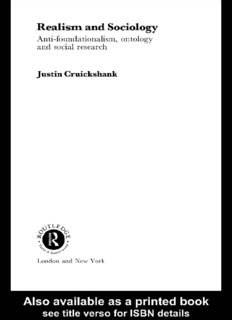
Realism and Sociology: Anti-Foundationalism, Ontology and Social Research PDF
Preview Realism and Sociology: Anti-Foundationalism, Ontology and Social Research
Realism and Sociology Can philosophy guide empirical research in the social sciences? In recent years methodological debates in the social sciences have increas- inglyfocusedonissuesrelatingtoepistemology.RealismandSociologymakesan original contribution to the debate, charting a middle ground between post- modernism and positivism. Critics often hold that realism tries to assume some definitive account of reality. Against this it is argued throughout the book that realism can com- bine a strong definition of social reality with an anti-foundational approach toknowledge.Thepositionofrealistanti-foundationalismthatisarguedforis developed and defended via the use of immanent critiques. These deal pri- marilywithpost-Wittgensteinianpositionsthatseektodefineknowledgeand social reality in terms of ‘rule-following practices’ within different ‘forms of life’ and ‘language games’. Specifically, the argument engages with Rorty’s neo-pragmatism and the structuration theory of Giddens. The philosophy of Popper is also drawn upon in a critically appreciative way. While the positions of Rorty and Giddens seek to deflate the claims of ‘grand theory’, albeit in different ways, they both end up with definitive claimsaboutknowledgeandrealitythatprecludesocialresearch.Byavoiding thegeneraldeflationaryapproachthatrelies onreferenceto‘practices’,real- ism is able to combine a strong social ontology with an anti-foundational epistemology, and thus act as an underlabourer for empirical research. Justin Cruickshank is a lecturer in Methodology and the Philosophy of Social Science in the Nottingham Graduate School for Social Research, at Nottingham Trent University. He is the Deputy Editor of the Journal of Critical Realism. Routledge Studies in Critical Realism Edited by Margaret Archer, Roy Bhaskar, Andrew Collier, Tony Lawson and Alan Norrie Critical realism is one of the most influential new developments in the phi- losophyofscienceandinthesocialsciences,providingapowerfulalternative to positivism and postmodernism. This series will explore the critical realist position in philosophy and across the social sciences. 1.Marxism andRealism Amaterialistic application of realismin the socialsciences Sean Creaven 2.Beyond Relativism RaymondBoudon,cognitive rationality and critical realism CynthiaLins Hamlin 3.Education PolicyandRealist SocialTheory Primaryteachers, child-centredphilosophy andthe new managerialism Robert Wilmott 4.Hegemony Arealist analysis Jonathan Joseph 5.Realism andSociology Anti-foundationalism, ontology andsocialresearch Justin Cruickshank Also publishedby Routledge: Critical Realism:Interventions Edited by Margaret Archer,RoyBhaskar, Andrew Collier, TonyLawson and AlanNorrie Critical Realism Essential readings Edited by Margaret Archer,RoyBhaskar, Andrew Collier, TonyLawson and AlanNorrie ThePossibilityofNaturalism 3rdedition Aphilosophical critique ofthe contemporary human sciences RoyBhaskar BeingandWorth Andrew Collier QuantumTheory andtheFlight fromRealism Philosophicalresponses to quantum mechanics Christopher Norris FromEast toWest Odyssey ofa soul RoyBhaskar Realism andRacism Concepts ofracein sociological research Bob Carter RationalChoiceTheory Resisting colonisation Edited by Margaret ArcherandJonathan Q. Tritter ExplainingSociety Critical realismin the socialsciences Berth Danermark, Mats Ekstru¨m,Jan C.Karlsson andLiselotte Jakobsen Critical Realism andMarxism Edited by Andrew Brown, Steve Fleetwood andJohn MichaelRoberts Critical Realism inEconomics Edited by Steve Fleetwood RealistPerspectives onManagement andOrganisations Edited by Stephen Ackroyd andSteve Fleetwood AfterInternational Relations Critical realismandthe (re)construction of worldpolitics Heikki Patomaki Realism and Sociology Anti-foundationalism, ontology and social research Justin Cruickshank London and New York Firstpublished2003byRoutledge 11NewFetterLane,LondonEC4P4EE SimultaneouslypublishedintheUSAandCanada byRoutledge 29West35thStreet,NewYorkNY10001 RoutledgeisanimprintoftheTaylor&FrancisGroup This edition published in the Taylor & Francis e-Library, 2003. #2003JustinCruickshank Allrightsreserved.Nopartofthisbookmaybereprintedor reproducedorutilisedinanyformorbyanyelectronic, mechanical,orothermeans,nowknownorhereafter invented,includingphotocopyingandrecording,orinany informationstorageorretrievalsystem,withoutpermissionin writingfromthepublishers. BritishLibraryCataloguinginPublicationData acataloguerecordforthisbookisavailable fromtheBritishLibrary LibraryofCongressCataloginginPublicationData Cruickshank,Justin,1969– Realismandsociology:anti-foundationalism,ontology,andsocial research/JustinCruickshank. p.cm. Includesbibliographicalreferencesandindex. ISBN0-415-26190-2 1.Sociology–Methodology.2.Sociology–Philosophy.3.Realism. 4.Ontology.I.Title. HM511.C782002 0 301.01–dc21 2002069961 ISBN 0-203-11670-4 Master e-book ISBN ISBN 0-203-16334-6 (Adobe eReader Format) ISBN0–415–26190–2(Print Edition) Contents List of figures ix Acknowledgements x Introduction 1 1 Thephilosophicallogicofimmediacy:theepistemic fallacyandthegeneticfallacy 7 Introduction 7 Popper and the critique of positivism 9 Popper on post-Kantian epistemology, falsifiability and metaphysical realism 11 Popper, the epistemic fallacy and the genetic fallacy 16 Putnam’s critique of metaphysical realism 19 Internal realism: conceptual relativity and realism 20 Searle on external realism and conceptual relativity 23 Putnam and the philosophical logic of immediacy 25 2 Thein£uenceofempiricismonsocialontology: methodologicalindividualismandmethodological collectivism 27 Introduction 27 Anticipating the sociological logic of immediacy 28 Methodological individualism defined 29 Assessing methodological individualism: the need for a non-individualist ontology 30 Methodological collectivism: overcoming the problems? 34 3 Post-Wittgensteinianpragmatism:Rorty, anti-representationalismandpolitics 37 Introduction 37 Realism and representation 38 Anti-representationalism and the philosophical logic of immediacy 40 viii Contents Liberalism and ethnocentrism 48 Nietzschean liberalism 52 Poetry contra politics 55 Pragmatism and female being 58 From postmodernism to positivistic-conservatism 62 4 Post-Wittgensteiniansociology:Giddens’ontologyof practices 69 Introduction 69 The importance of ontology 70 Rule-following practices 71 The ontological status of structures 76 Problems with rules 78 Problems with linking the micro and the macro levels 85 What is the purpose of structuration theory? Or, what is the link between ontology and methodology? 90 5 Socialrealism:overcomingthesociologicallogicof immediacy 95 Introduction 95 Bhaskar on the philosophy of science: from empirical realism to transcendental realism 95 Transcendental realist naturalism: Bhaskar’s social ontology 103 Developing the ontology 106 Challenges to social realism 114 Rejoinder to the challenges 117 6 Socialrealismandthestudyofchronicunemployment 122 Introduction 122 Defining the underclass 122 Studying the chronically unemployed as members of the working class 134 Doing ‘fiddly jobs’: an ethnographic understanding of coping strategies to deal with structural unemployment 135 The role of gender 136 The underclass and the sociological logic of immediacy 140 Realism as an underlabourer 143 Notes for the construction of a domain-specific meta-theory for researching the chronically unemployed in Britain 145 Notes 154 Bibliography 161 Index 169 Figures 5.1 Bhaskar’s original TMSA model 109 5.2 The improved model 110 5.3 Archer’s morphogenetic/static cycle and its three phases 111 6.1 Levels of realist theorising 144 6.2 Network-specific CEPs and SEPs 150 6.3 Corporate agents and networks 151 6.4 Contexts and corporate agents 151 6.5 Primary agents and networks 152
Description: